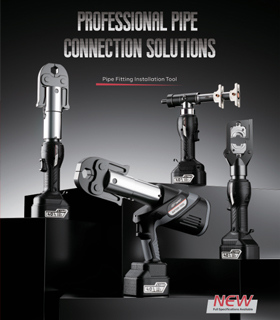In the plumbing industry, the efficiency and effectiveness of any installation or repair job largely depend on the quality and type of tools used. Among the essential tools in a plumber's arsenal are pipe plumbing tools, which are designed to handle various tasks such as cutting, bending, and joining pipes. Let's delve into the specifics of pipe crimping tools and pipe compression tools, which are crucial for creating secure and leak-free connections in plumbing systems.
1. Pipe Plumbing Tool Basics
A pipe plumbing tool is any device used in the installation, maintenance, or repair of plumbing systems. These tools are designed to work with pipes made from various materials, including copper, PVC, and steel. The primary function of these tools is to ensure that pipes are properly cut, shaped, and connected to form a functional and durable plumbing system.
2. Pipe Crimper Tools
Pipe crimping tools are specifically designed for use with compression fittings, which are used to join pipes without the need for soldering or welding. These tools work by applying pressure to a fitting, which then compresses around the pipe, creating a tight seal. The crimping process is crucial for ensuring that the connection is secure and will not leak.
- Types of Pipe Crimper Tools: There are various types of pipe crimpers available, including manual, hydraulic, and battery-powered models. Each type has its advantages, with manual crimpers being portable and cost-effective, while hydraulic and battery-powered models offer greater force and precision.
- Applications: Pipe crimping tools are used in a wide range of applications, from residential plumbing installations to commercial and industrial settings. They are particularly useful in situations where a quick and secure connection is needed without the mess and time associated with soldering.
3. Pipe Compression Tools
Pipe compression tools are a subset of pipe crimping tools, specifically designed for use with compression fittings. These tools are essential for creating airtight and watertight seals in plumbing systems.
- How They Work: A pipe compression tool typically consists of a handle, a ratchet mechanism, and a set of dies that match the size and type of the compression fitting. When the tool is used, the dies grip the fitting and the ratchet mechanism applies pressure, causing the fitting to compress around the pipe.
- Importance of Proper Use: Using the correct pipe compression tool for the specific type and size of fitting is crucial. Using the wrong tool or applying too much or too little pressure can result in a poor connection, which may cause leaks or even pipe failure.
4. Features of High-Quality Pipe Plumbing Tools
When selecting pipe plumbing tools, there are several features to consider to ensure that you have the equipment for the job:
- Durability: High-quality tools are made from durable materials such as hardened steel, which can withstand the rigors of daily use without losing their effectiveness.
- Ease of Use: Look for tools with ergonomic designs that reduce fatigue and allow for greater control during use.
- Precision: The pipe crimping tools offer precise control over the crimping process, ensuring that fittings are compressed evenly and securely.
- Versatility: Some tools are designed to work with multiple sizes and types of fittings, making them versatile and valuable additions to any toolbox.
5. Maintenance and Care
Proper maintenance of your pipe plumbing tools is essential for prolonging their lifespan and ensuring they continue to perform at their best. This includes:
- Cleaning: Regularly clean your tools to remove any debris or residue that may have accumulated during use.
- Lubrication: Apply lubricant to moving parts as needed to ensure smooth operation.
- Storage: Store your tools in a dry place to prevent rust and damage.
6. Conclusion
Investing in high-quality pipe plumbing tools, such as pipe crimping and compression tools, is a wise decision for any professional in the plumbing industry. These tools not only make the job easier and more efficient but also contribute to the overall quality and safety of the plumbing systems they are used to construct and maintain. By understanding the features and proper use of these tools, plumbers can provide top-notch service and ensure customer satisfaction.




 English
English Español
Español русский
русский Français
Français Deutsch
Deutsch Português
Português














